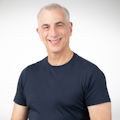Five years ago, I challenged my 47-year-old chiropractor to a contest to see who could hold a plank the longest. We put it all together, publicized it to our patients and friends, and had them purchase tickets and bet on the outcome. Dr. Raj Gupta, the man who saved my career and the quality of my life, started caving at three minutes and dropped at slightly under four minutes. I made it to eight minutes. The most remarkable thing about that stunt is that it happened on my 65th birthday! Then, 10 months later, I hit my personal best of 10:27. I’m now training to break 12 minutes before I turn 70. I hit nine minutes a few weeks ago—I’m going to do it!
Related reading:
- Dentistry is hard. It's OK to ask for help
- What retirement planning is (and isn’t)
- Are you in a state of discombobulation?
Life in general, like dentistry, is not meant to be easy. The sacred work that we do is a lot more strenuous than I thought it would be when I entered dental school in 1977. It takes a toll on our bodies, especially our backs and our posture. It strains our eyes, even if we use loupes. It causes fatigue at the end of a tough day. And most of us have realized in the last few years a fact that I’ve been aware of for a long time: our profession puts all of us at increased risk of mental health problems. Tragically, our occupation consistently ranks in the top 10 for the risk of depression and suicide.
Aging is optional
So say Chris Crowley and Henry Lodge in their classic book, Younger Next Year. They claim, with scientific evidence, that most of us can live well into our eighties as healthy and vibrant human beings. Although it is true that we begin to age by the end of our twenties, it is possible to take control of that process and stay powerful. Seventy percent of what we feel as aging is optional if we follow three basic disciplines.1
Clean up that diet
Food is fuel. Good fuel keeps your engine—in this case, your body—running at its best. Food is also fun. Who doesn’t like a good drink with friends, a hot dog at a baseball game, or a good slice of New Jersey pizza? We need to reconcile this paradox for ourselves. Dr. Tom Bilella, the nutritionist who saved my life and helped me get into the shape I’m in today, was perfectly fine with two “cheat meals” a week. Eliminate or minimize processed foods, refined flour and sugar, artificial sweeteners, tobacco, and alcohol, and you’ll feel a huge difference. For me, that meant giving up bagels, bread, and all soda. Take your weight, divide it in half, and that’s the number of ounces of water you need to drink daily. I weigh 184 pounds; I drink 92 ounces of water. Yes, coffee counts. And make sure you nurture your gut microbiome with lots of fiber—at least 25 grams per day—with food or supplements.
Some people advocate a plant-based diet; others do not. Some people recommend supplements; others do not. Like many things in life, there is more than one right answer. Consult a nutritionist or a health coach, find a nutrition scheme that works for you, and stick to it. The result will be magical!
Get some exercise
Genetically and anthropologically, we are meant to move. We are hunters and gatherers at the cellular level. Exercise not only feels good (after you’re done, of course), it also signals to your body that it has a reason to exist. My friend, a 90-something retired dentist, works out and goes hiking and cross-country skiing regularly. He’s lean, mentally sharp, and physically awesome. He’s one of my inspirations.
As a baseline, do 150 minutes of moving every week. How you do it isn’t important. You can walk, run, row, or do anything that moves your body. Then add two sessions of resistance training a week. Simple push-ups are great. If you can’t do a push-up (yet), push yourself away from a wall in a standing position.
Right now, I’m working with a trainer to improve my flexibility and my dentistry-induced rounded shoulders, and also doing high-intensity group classes. It doesn’t matter how you do your exercise. Just start somewhere and work your way up. And, of course, consult your physician before beginning any exercise regimen. We are all different.
Build and foster your connections
Crowley and Lodge assert that mammals are built to function in groups.1 It’s critical to our physical and emotional well-being to have some affiliation with a group or groups of like-minded people. My daughter’s softball teams were great fun and provided some good socialization for us. Religious groups provide support on so many levels. Community groups like chambers of commerce, networking groups, charitable organizations, or even, dare I say, political groups provide the sense of belonging we all need. That’s why dental life is better when you belong to an in-person study club. For me, my Seattle Study Club, my synagogue, and my gym provide me with the deep connections that give and sustain life.
Don’t forget your mental health
Please always remember that the stress levels across the globe are at an unprecedented high. If the stressors of our profession and our times are overwhelming, please seek help. Not only is there no longer any shame in this, there is as true a need for it as there is for physical therapy for injuries. Therapists, coaches, mentors, or even a close confidante can make the difference between a good life and a not-so-good one.
Don't just live—thrive
Thanks to technology and medicine, we are living longer. If you make it to 60, your chances of getting to 80 and beyond are pretty good. But there’s a big difference between surviving to age 100 and living to age 100. As I watched my mother-in-law survive to 101, strapped to a geri-chair by day, sleeping in a bed with rails by night, and slowly but surely losing her mental faculties, I felt awful for her. She wasn’t really living. At the time of this writing, President Jimmy Carter is at the end stage of his life at age 98. After his presidency, he remained active, vibrant and vital, until very recently. He even fought off metastatic melanoma and kept on living his life. I am certain that President Carter’s lifestyle allowed him to live to an advanced age. As important as it is to plan for retirement financially, I believe it’s more important to plan against the risk of getting older. The sooner we start living a healthy lifestyle, the greater our chance of thriving into our eighties and beyond.
Of all the emotions I’m feeling as I anticipate my 70th birthday, the one I focus on is the excitement of my physical and mental power at an age that used to be associated with decline. I am looking forward to refirement as I continue to be productive, impactful, and strong. I’m also determined to hit that 12-minute plank while I’m still 69!
I can do this, and so can you. Let’s go!
Editor's note: This article appeared in the May 2023 print edition of Dental Economics magazine. Dentists in North America are eligible for a complimentary print subscription. Sign up here.
Reference
- Crowley C, Lodge HS. Younger Next Year: A Guide to Living Like 50 Until You’re 80 and Beyond. Workman Publishing Company; 2005.
About the Author

Alan G. Stern, DDS
Alan G. Stern, DDS, is a practicing dentist, an ACE Behavior Change Specialist, and the founder and operator of Better, Richer, Stronger, a coaching service for dentists and their teams. He helps clients find focus, energy, momentum, and the results they no longer thought were possible. Dr. Stern is available to speak at study clubs, dental conferences, and meetings, and to coach dentists and their teams. He can be reached at [email protected].
Updated April 4, 2023
